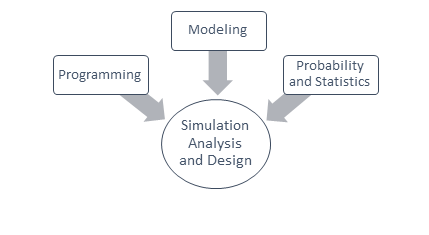Experimenting or manipulating real-world systems to the desire of an engineer is often very expensive and time taking process. The chances of favourable or unfavourable outcomes are often assumed intuitively based on the experience. Those uncertainties put various factors at stake, including, but not limited to, working capital, time, and other resources.
To study systems and processes, engineers use simulation , which is virtual modeling of real-world systems with uncertainties; this is followed by experimenting and analyzing those models to optimize the real-time performance metrics.
In MSE 333, students learn about Discrete-Event System Simulation modeling techniques, and apply them to virtually model real-world systems in any programming platforms, experiment on them under given uncertainties, and recommend managerial decisions with estimated benefits and downfalls rather based on intuition.

Example
Hospital Emergency Departments operate 24x7. The arrival pattern and nature of attention required for each patient is unknown before they arrive. A patient may arrive with a life-threatening issue needing immediate attention or with a relatively simple one. In any case, all patients should be treated. There are various decisions to be made to save or treat as many patients as possible, including:
- How many paramedics, nurses and other resources (pediatricians, pharmacists, psychiatrists, therapists, etc.,) are required at any given time?
- What should the stock levels of various medicines and medicating devices at the pharmacy be?
- What equipment should be held at each unit or room within the emergency department? Example: EMTs, Defibrillators, X-ray machines, etc.,
Deriving these decisions based on intuition might result in a fatal error or under-utilization of resources, due to a likely suboptimal decision. Therefore, having an optimal level of resources (equipment, paramedics, nurses, etc..,) will not only increase the utilization but also lower the fatal loss (i.e., maximum benefit). Any excess resource can be used where they are required most.
Application of Simulation in Healthcare: The hospital emergency department can be virtually modelled as a simulation program and thus experimented with. Through experimentation of the built simulation program, optimal decisions can be made with statistical evidence. This would drastically save the time, cost and lives of numerous patients.